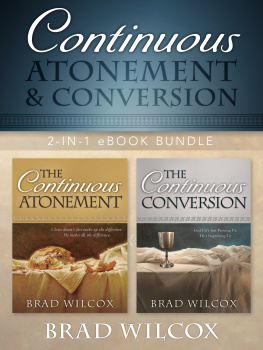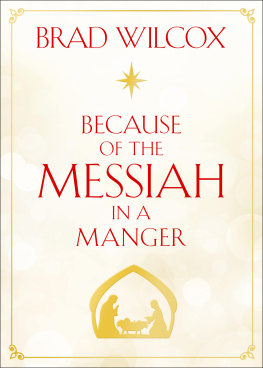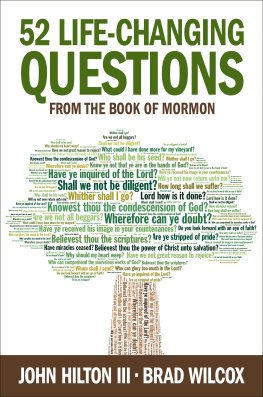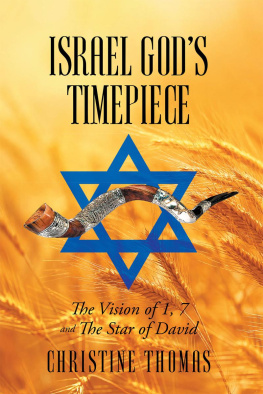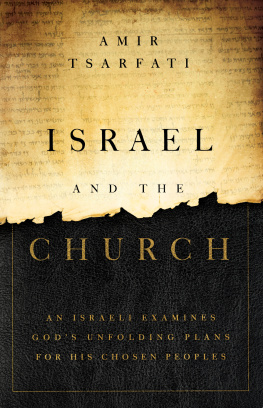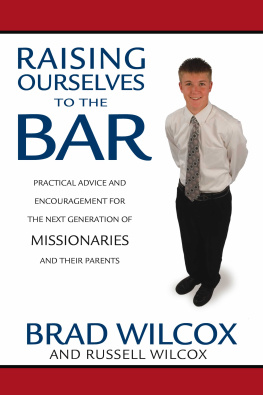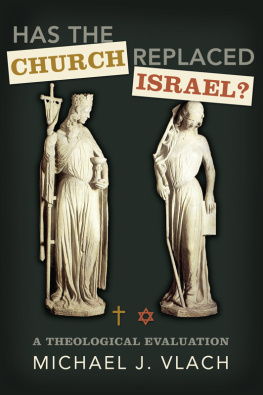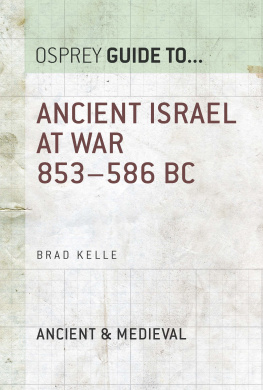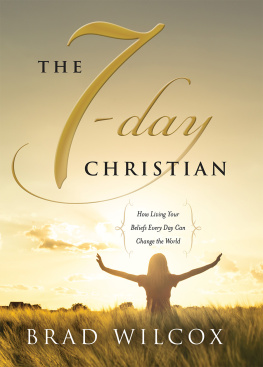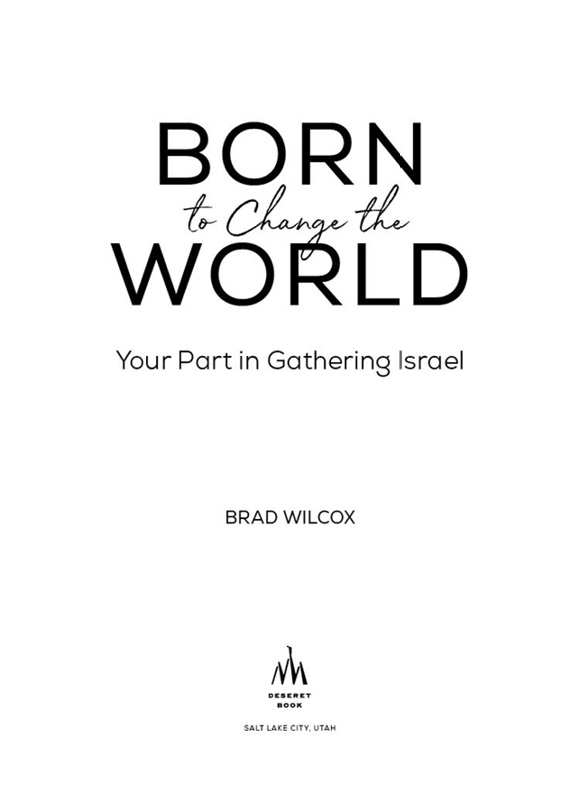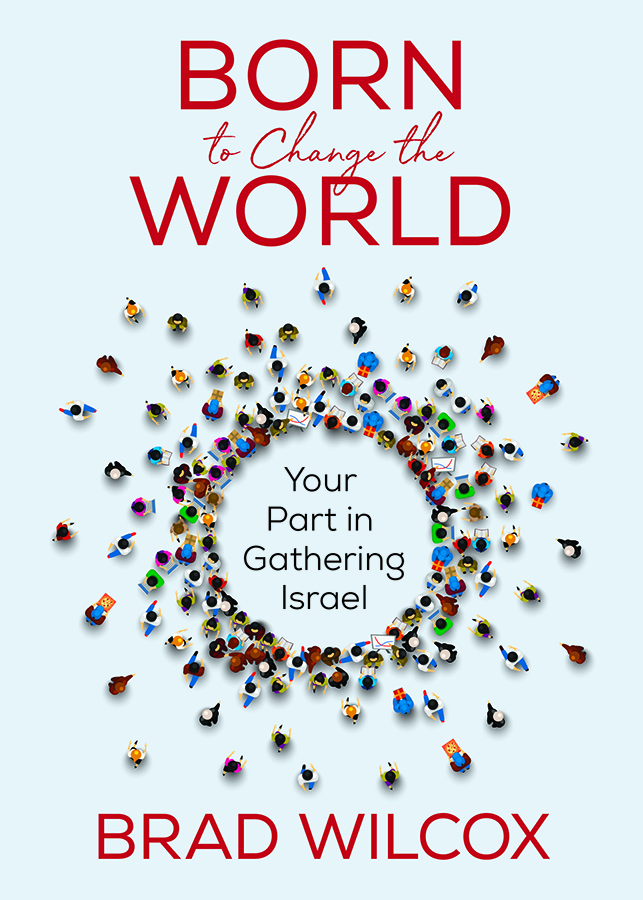
World illustration on chapter opening pages foxaon1987/Shutterstock.com
2019 Bradley Ray Wilcox and Deborah G. Gunnel Wilcox Family Trust
All rights reserved. No part of this book may be reproduced in any form or by any means without permission in writing from the publisher, Deseret Book Company, at permissions@deseretbook.com or PO Box 30178, Salt Lake City, Utah 84130. This work is not an official publication of The Church of Jesus Christ of Latter-day Saints. The views expressed herein are the responsibility of the author and do not necessarily represent the position of the Church or of Deseret Book Company.
Deseret Book is a registered trademark of Deseret Book Company.
Visit us at deseretbook.com
Library of Congress Cataloging-in-Publication Data
(CIP data on file)
ISBN 978-1-62972-589-5
Printed in the United States of America
PubLitho, Draper, Utah
10 9 8 7 6 5 4 3 2 1
To President Russell M. Nelson, whose BYU devotional Thanks for the Covenant, given in 1988, lit a fire under me to study and teach about the house of Israel, which I have done ever since.
Also to his wife, Wendy Watson Nelson, who was surely raised up for such a time as this (Esther 4:14).
Contents
Chapter 1
Chapter 2
Chapter 3
Chapter 4
Chapter 5
Chapter 6
Chapter 7
Acknowledgments
Thanks to my wife, Debi, and my daughters, Wendee Rosborough and Whitney Laycock. They are always my first and most patient editors. Thanks also to Russell, Trish, Gian, Landon, David, and all my wonderful grandchildren. The support and love I feel from my family fills me with great purpose and joy.
I appreciate Lisa Roper, who never gave up on the idea of this book. It would not have happened without her. Thanks also to Sheri Dew and Laurel Day for supporting this project and seeing its potential and to Tracy Keck and Shauna Gibby for helping complete it. Im grateful for friends and colleagues whose contributions were essential: Elder Jorge Becerra, Avram R. Shannon, Jeffrey R. Chadwick, M. Steven Andersen, Doug Rich, Brett Sanders, and Ryan Sharp. Thanks to Brian Quinlan, who created the original graphics, and Gerrit Van Dyk, who helped with references. Lori Soza, Jeanine Ehat, Cody Sanders, and Evita Chatterley help me stay on top of this crazy life of mine. Their support is appreciated, as is the support of my great teaching assistants: Jake Robins, Braden Goimarac, Marisa Maxwell, and Makayla Lake.
It was forty years ago that a man named George Bickerstaff challenged me to write a book and a teacher named Chloe Vroman mentored me through that process. They are both gone now, but I hope they know I am forever grateful for their influence.
Introduction
Consider some questions I have often heard when Ive taught about the gathering of Israel:
- So Im from Ephraim or Manasseh? So what?
- What does it mean if Im from another tribe?
- I know the twelve oxen under temple baptismal fonts represent the tribes, but why?
- What does it mean to gather Israel?
On other occasions, youth have asked further questions:
- We are told we are children of God, but isnt everyone?
- So weve been saved for the last days. Hasnt everyone on earth right now been saved just as long? How does that set us apart?
Those not of our faith ask different questions:
- Why do you have to go on missions and do family history and temple work when other people dont?
- Why does your church have so many different rules and commandments than other churches?
At first, the three groups of questions may seem unrelated, but they are not. Answers to the first questions about gathering Israel can help us answer the other questions about who we are and why God can and does expect so much of us.
In a worldwide youth devotional in June 2018, President Russell M. Nelson proclaimed, The Lord is hastening His work to gather Israel. That gathering is the most important thing taking place on earth today. Nothing else compares in magnitude, nothing else compares in importance, nothing else compares in majesty.... I testify that the gathering is now, and it is real.
The purpose of this book is to help you better understand the scriptures about gathering Israel as well as the writings of Church leaders and teacherspast and presenton this topic. Most important, my hope is that this book can help you prepare to team up with God and play your vital part.
Hope of Israel, Supplement to the New Era and Ensign , August 2018, 8.
.

A Noble Birthright
Latter-day Saints gather. We gather in homes and chapels. We gather in large arenas, stadiums, and conference centers. We gather in tabernacles and temples. Sometimes we are so busy gathering that we forget what it is all for. Elder Spencer V. Jones wrote, The doctrine of gathering is eternal in nature and broad in scope.... Each gathering strengthens, purifies, and prepares us. For what? For more gathering! Ultimately, God wants to gather as many of His children who are willing to live with Him and like Him eternally. To that amazing end, He must first gather His gatherers. Thats us!
Scriptures call Latter-day Saints a peculiar people (1 Peter 2:9), and we certainly live in a way that most people find different. However, peculiar in this context does not mean strange or weird, but rather set apart and sealed.
As children growing up in the Church, we are told we need to obey commandments because we are children of God. Thats true, but who isnt? As teens, we are taught we must stay strong in the Church because we have been saved for the last days. Also true, but hasnt everyone on earth right now been saved just as long? As important as these truths are, they do not fully explain why we must live so differently. However, there is another truth that does: We have a noble birthright (see Hymns , no. 255).
If we look up birthright in the Bible Dictionary, we are directed to see Firstborn. Under that heading we learn, In the patriarchal order, the firstborn son is the heir and inherits the leadership of the family upon the death of the father. This is often spoken of in the scriptures as birthright (Gen. 43:33). Under the law of Moses, the firstborn son was regarded as belonging to God.... The eldest son received a double portion of his fathers possessions (Deut. 21:17); and after his fathers death, he was responsible for the care of the mother and sisters.
Imagine a wealthy family in Old Testament times: father, mother, four sons, and three daughters. Who gets the money when Dad dies? Most would point to the firstborn son, but thats just partly right. If Dad has four sons, his estate is divided into five equal shares. All the sons receive a portion, but the eldest, who has the birthright, receives twoa double portion. The three younger brothers leave with their portions, but the eldest doesnt go anywhere because with his extra portion comes added responsibility. He is expected to care for his mother and provide dowries so his sisters can be properly married. Even after his mother and sisters are gone, he will stay to govern the affairs of his fathers estate. Of course he will marry and have his own family, but he will spend the rest of his life fulfilling his birthright responsibilities.



